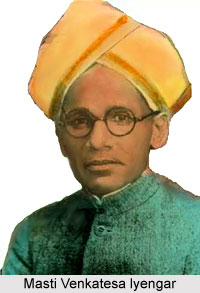 Masti Venkatesa lyengar was a Kannada fictionist, poet, playwright, and critic belonging to the Navodaya or renaissance period of literature. He is born into a very poor family in 1891. He studied hard for brilliant academic results, and joined the civil service of Mysore state where he held high posts.
Masti Venkatesa lyengar was a Kannada fictionist, poet, playwright, and critic belonging to the Navodaya or renaissance period of literature. He is born into a very poor family in 1891. He studied hard for brilliant academic results, and joined the civil service of Mysore state where he held high posts.
Venkatesa lyengar composed thirteen original plays, most of which have historical themes in Kannada theatre or mythological themes in Kannada theatre. Following convention, they begin with a nandi and end with a baratavakya. Deeply influenced by the professional Company Nataka movement in Kannada theatre, he wove musical, lyrical, and folk elements into them. His only specifically social drama, Manjula in 1930, surprisingly depicts the necessity of two wives for a young man. Although his mythological plays explicate the hidden motifs of the myths, he does not try to modernize them or offer a contemporary reinterpretation. His retention of the supernatural element and improbability of events so typical of myths is not very convincing or palatable to modern audiences. Santa i.e. `Saint` in 1933 dramatizes the life of Rishyashringa in the Ramayana with a few minor changes. In Savitri in 1933 he again makes only small alterations in the heroine`s mythical story. Usha in 1933 depicts the love affair between Banasura`s daughter Usha and Lord Krishna`s grandson Aniruddha.
Among the historical drama, Talikote in 1929 deals with the love of Ramaraya, last king of the Vijayanagar Empire, for a Muslim girl. The play ended in tragedy. Yasodhara in 1936 delineates the heroine`s mental agony after Siddhartha`s departure to become the Buddha. Shivachhatrapati in 1937 was one of his better plays. In this play he described Shivaji`s life and final agreement with Aurangzeb. Kakana kote i.e. `Kaka`s Fort` in 1938, may consider his best play. This presents the problem of the loss of cultural identity of the Kadukuruba tribe. Masati i.e. "Great Sati" in 1953 effectively shows the horrible practice of sati committed by a young wife. Anarkali in 1955 relates the cruel way in which the maid Anarkali is treated in Emperor Akbar`s palace. Bhattara magalu i.e. `Bhattas Daughter` in 1969 portrays Mannar`s oscillation between attraction to his wife and renunciation. Some of the historical works treat devotional subjects. Timpani in 1937 dramatize the story of a low-caste protagonist who attains the grace of Ranganath through the picture of intense devotion and becomes an Alwar. Purandaradasaru i.e. `On Purandaradasa in 1964 depicts the life of the eponymous hero who turned into a saint-poet. Kanakanna in 1965 shows how a rich lord comes under Timmanna Guru`s influence and becomes the great saint Kanakadasa.
Masti translated eight plays. The names can be mentioned as Chitrangada from Rabindranath Tagore`s English Chitra, and Shakespeare`s Hamlet, King Lear, The Tempest, Twelfth Night, and some fragments. Since all these translations are literal, they do not convey the rich semantic dimensions of Shakespearean language, imagery, and allusions. They look rather antique and disappoint the contemporary reader. Masti also wrote a drama in English on Kalidasa, seven radio plays, and an autobiography as well.
Masti Venkatesa lyengar was a prolific writer, he wrote more than 120 books in Kannada and 17 in English, for over seventy years. He won the Jnanpith Award in 1983 for his novel Chikkaveera Rajendra. The story was about the last Kodava king. Kodava community was displeased with the negative portrayal of their last king but that is a different story. Venkatesa lyengar died in 1986 at the age of 95.




















